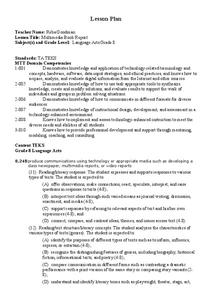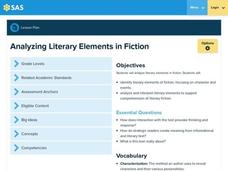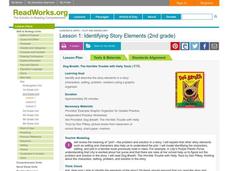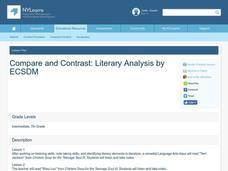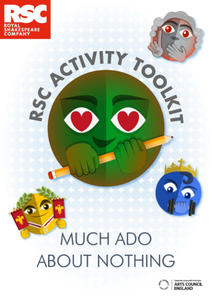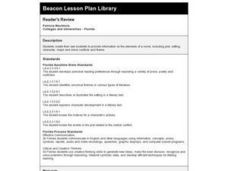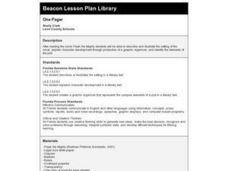EngageNY
Introducing Readers Theater: Pygmalion
It's time to put on a show! Scholars participate in a Pygmalion Readers Theater. They discuss the text-dependent questions from the previous lesson and revisit the Eliza Character Tracker. To end the lesson, individuals reflect on their...
EngageNY
Grade 10 ELA Module 1: Unit 3, Lesson 2
Sometimes, sensory details can bring you back to a familiar place. Study the setting descriptions from a critical chapter in Amy Tan's A Joy Luck Club, and discuss how they enhance the book's plot and contribute to a central theme.
EngageNY
Introducing Working Conditions in the Mills
Scholars discover how working in a textile mill in the nineteenth century affected the title character from Katherine Paterson's novel, Lyddie. Partners analyze quotes from the novel and then add evidence and questions about...
EngageNY
Analyzing: Key Scenes in Pygmalion
Class members work on Pygmalion section seven text-dependent questions. They then act out part of the play in a reader's theater and finish the lesson by revisiting their Eliza Character Trackers, adding any new information they...
Livaudais-Baker English Classroom
Literature Circles
Keeping readers focused during literature discussion circles can sometimes be a challenge. Check out this worksheet that ensures accountability by establishing six very specific, very different roles for group members: facilitator,...
Curated OER
Where the Red Ferns
Where the Red Fern Grows provides the text for a study of the literary elements of plot, character, and setting. Discussion questions and vocabulary lists are referenced but not included.
Curated OER
Multimedia Book Report
Young readers plan and draft a book report focusing on the five key components of a novel: plot, character, setting, conflict, and theme. After completing a story board, pupils then prepare a PowerPoint book report that is shown to the...
Mary Pope Osborne, Classroom Adventures Program
The Backpack Travel Journals
Strap on those backpacks, it's time to travel through history with this literature unit based on the first four books of The Magic Tree House series. While reading through these fun stories, children create story maps, record...
Curated OER
The Lord of the Flies by William Golding
Tenth graders read and analyze the novel Lord of the Flies by William Golding. They examine the setting, plot, and climax in the novel. Character descriptions, good, evil symbolic images within characters are dissected in detail with...
Curated OER
Who? What? Where? When? - Story Elements
Second graders see how to identify and describe character, setting, and plot in various stories from picture books and story videos. They use picture books and story videos to practice identifying and describing the story elements.
Pennsylvania Department of Education
Analyzing Literary Elements in Fiction
Young scholars analyze the characters and events in fictional writing. In this literary elements lesson, students study the meaning of the words characterization and fiction. They listen to the story Pigsty by Mark Teague, or any other...
Curated OER
PowerPoint Short Story Report
Students make a Microsoft PowerPoint report from a short story read in class. They summarize and paraphrase a short story identifying the six story elements: characters, setting, plot, conflict, solution, tone/mood.
Curated OER
Comparing Characters Across Two Short Stories
Ninth graders listen to a read aloud of two short stories focusing on literary devices. The write about the settings and realism of the stories, and decide each main character handles the conflict he faces with nature.
Curated OER
Sam and the Lucky Money
Third graders read the story "Sam and the Lucky Money". Individually, they identify new key terms from the story. In groups, they examine the setting and discuss how it relates to the plots and characters. To end the lesson, they read...
Curated OER
Chocolate Chaos
Second graders demonstrate the ability to examine the elements of a story (theme, plot, setting, mood) and characters, by discussing and writing about each. They have fun with chocolate related activities and enjoy reading about some...
Curated OER
Identifying Story Elements
Second graders explore story elements. In this language arts lesson, 2nd graders identifying characters, setting, and plot in familiar stories. Students listen to a story and complete a graphic organizer.
Curated OER
Multimedia Book Reports
Students read a chapter book of 100-200 pages in length. They create a story map and multimedia book report. Pupils review the elements of a story map such as: characters, setting, problem, important events, solution, etc.) Students...
Curated OER
Literary Analysis - Young Goodman Brown
Why is literary analysis so important? Readers explore writing a literary analysis by reviewing literary elements such as character, metaphor, plot, setting, simile, personification, and style. They read "Young Goodman Brown" by...
Curated OER
Compare and Contrast: Literary Analysis
Seventh graders are able to use active listening skills, take notes and identify literary elements of a short story. They use/create graphic organizer, compare/contrast literary elements from various stories and compare and contrast traits.
Curated OER
When A Story Met A Sandwich
How is a story like a peanut butter and jelly sandwich? Use making a sandwich as a metaphor to remind your writers that a good, solid beginning, a rich and rewarding middle, and an ending that brings everything together spices up a...
Roald Dahl
Fantastic Mr. Fox
A fancifully illustrated guide to Roald Dahl's Fantastic Mr. Fox, this series of lessons, activities, and tasks could be used in its entirety or picked apart and used piecemeal. Have young readers investigate the role of dialogue in...
Royal Shakespeare Company
RSC Activity Toolkit: Much Ado About Nothing
Are you frustrated by searching for activities to engage readers in their study of Much Ado About Nothing? Sigh no more. Young thespians will find much to do in this Royal Shakespeare Company 23-page Toolkit. Included in the sections are...
Curated OER
Reader's Review
Students create booklets to provide information on elements of a novel, including plot, setting, character, major and minor conflicts and theme.
Curated OER
One Pager
Students read the novel, Freak the Mighty and describe and illustrate the setting. They create a graphic organizer that demonstrates the major plot elements and character development.
Other popular searches
- Character Plot Setting
- Character Plot Setting Theme
- Plot Setting & Character
- Plot Character and Setting
- Plot, Character and Setting
- Character, Plot, Setting
- Character, Plot and Setting
- Plot, Setting, Character






